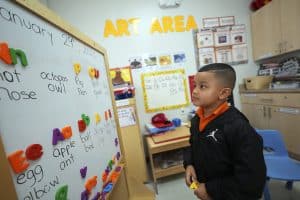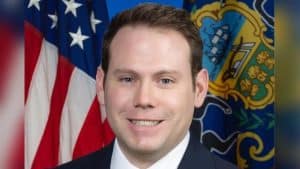*An earlier version of this story attributed a quote to Lee Rush. The quote was made by Leah Rash not Lee Rush. Mr. Rush was never interviewed for this story. We sincerely regret the error.*
Pennridge School Board President Joan Cullen spoke with Talk Radio’s Dom Giordano Tuesday to weigh in about neighboring district Central Bucks and its push to ban books from district libraries. The right-wing radio host Giordano started off the conversation with a question that was directed towards Cullen by a librarian, “Why is it that Joan Cullen and a group of people in Pennridge get to say “Bluest Eye is in, and these other books are not?”
Cullen’s gaslighting response was that librarians and others that opposed book bans were making a politicized controversy where there was previously none. She reiterated that the board has always made “determinations on curriculum” and student exposure. She contended that due to social trends book publishers have been creating an “influx” of pervasive content intended for young students.
Then Giordano mentioned that this content is largely focused on transgender issues. Cullen replied by citing “statistics” about transgender youth and stated that schools are no place for those kinds of discussions or inclusion.
“We in Pennridge decided that’s not something that should be introduced in the schools. Its controversial,” said Cullen. “Ninety percent of children that develop gender dysphoria revert back to their biological sex.”
Yet Cullen failed to reveal where she got that information. Perhaps because, as is most of what comes out of Cullen’s mouth, the stats she cited are inaccurate and salacious. Her response was a targeted attack on the inclusion of Transgender stories in school libraries. More so, evidence of Cullen’s claims have been discredited due to the flawed methodology of those studies, such as one 2013 study co-authored by Thomas Steensma, a researcher and clinician at the Center of Expertise on Gender Dysphoria in Amsterdam. Diane Ehrensaft, director of mental health at UCSF’s Child and Adolescent Gender Clinic in San Francisco, revealed that a good majority of Steensma’s participants were simply “proto-gay boys whose parents were upset because they were boys wearing dresses.” Ehrensaft maintained that those boys were brought to the clinics because they weren’t fitting into traditional gender norms.
An article published by California’s KQED public media, an affiliation of PBS, reported that clinicians, along with Ehrensaft, have criticized Steensma’s findings based on methodological grounds “because the researchers defined anyone who did not return to their clinic as desisting,” meaning here the transition back to their biological sex. (Children and adolescents who don’t transition back are called ‘persistors’) According to the study, out of 127 adolescents, 52 were classified as desistors or their parents did send back questionnaires showing the subjects’ present lack of gender dysphoria. However, 28 participants either didn’t respond nor could they be tracked down. KQED also reported that 38 of the 127 kids were originally designated “subthreshold” for gender identity disorder, meaning they did not fulfill all the proper criteria for meeting an official diagnosis.
“ You can’t do that in scientific studies,” Ehrensaft said. “You have to have your subjects in front of you and know who they are. You can’t just assume somebody is in a category because you don’t see them anymore.”
Perhaps Cullen was looking at the current Standards of Care written by the World Professional Association for Transgender Health which cautions that “a change back to the original gender role can be highly distressing.” However, Ehrensaft pointed out that this cautionary tale is based upon one qualitative study in which Steensma looked at the dilemma of just two Dutch girls who’d transitioned when they were in elementary school and wanted to switch back.
“The stress [of detransitioning] comes from microaggressions and lack of acceptance in the environment,” Ehrensaft told KQED, “If we offer social support and opportunities for children over time, we don’t have any evidence that [detransitioning] will be damaging for them.”
Lack of acceptance in a child’s environment spills over to include public schooling regardless of what Cullen told Giordano. Cullen believes that Transgender or LGBTQ issues are strictly “at-home” situations with no place in the child’s educational setting. These exclusionary ideologies-turned-policy have been demonstrated by several Bucks County school boards such as Central Buck’s new library policy 109.2, which gives the CB board and their-yet-to-be-determined appointees control over what students can freely access in their schools libraries. Within Joan Cullen’s own district of Pennridge, books dealing with gender identity such as “Heather Has Two Mommies” were removed from library shelves last year along with the school board’s decision to dissolve their Diversity, Equity, and Inclusion initiatives, an idea suggested by Joan Cullen.
Pushback from the community prompted the return of such books to library shelves though Cullen’s commentary on Giordano’s podcast suggests that this may only be temporary as one Pennridge parent, Leah Rash, found Cullen’s remarks distressing.
“As a resident of Pennridge, when I hear the president of our school board giving false information, not taking time to investigate the truth, and playing up to people with her same ideology, it makes me question her leadership ability and distrust her decision making,” said Rash.
Students are being restricted in what they are learning about and what materials are available to them, especially for transgender, LGBTQ, and students of color. What Cullen also failed to mention in her remarks was that Bucks County school districts already had measures in place for screening inappropriate materials and that parents have always had an option to opt their children out of lessons or material they did not condone. Thus her claims of how parents of Pennridge and Central Bucks created a politicized scenario over library materials is grossly untrue. In reality, district board members and administration are actually the ones who have politicized the nature of inclusionary practices, reading materials, and the job of librarians who have always adhered to state and national standards provided to them. In fact, according to the 2019 Guidelines for Pennsylvania School Library Programs, inclusion is key to a child’s successful educational experience.
The first group of stakeholders listed by the guidelines are, in fact, the students:
“When these learners advocate, key decision makers are more likely to listen. When students are given the voice to provide input into the culture, services, and environment of the library, the library will flourish as a strong center of learning.”
The guidebook also states that “the school library offers spaces to enhance all types of learning and to meet the needs of all learners and should be a welcoming, inviting, and ‘dynamic learning center’ to all students.” Highlighting examples of learning, and promoting literacy is the number one goal of a school library, of any library really, and that encompasses providing a wide range of materials geared towards ALL students, including those of marginalized groups.
Diane Ehrensaft believes that “the conventional treatment of transgender children has been based, for the most part, on traditionally negative views of gender nonconformity.” Thus, I would pose Ehrensaft’s next question to Joan Cullen and the rest of the Pennridge and Central Bucks school boards: “Why are we asking a child to conform to something that is not them because society hasn’t done its learning yet?” And no Ms. Cullen, that question is not rhetorical.
Pennridge School Board’s next policy meeting is to be held on Monday, August 1st at 6:30 EST.






